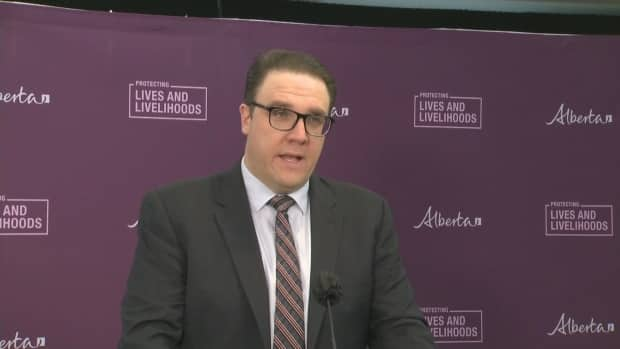New legislation could allow voters to recall MLAs, councillors or school trustees

Alberta voters will have ability to recall their MLAs, municipal representatives or school board trustees before the next provincial election should new legislation pass this spring, the government says.
Government house leader Jason Nixon said a pledge to adopt recall legislation was in the United Conservative Party election platform, and he wants the citizen-led mechanism in place as soon as possible.
"Obviously, the process has to be done right, and make a sustainable system within our election system to make that work," Nixon said on Wednesday.
At a news conference highlighting some of the bills coming to the legislature this spring, Nixon said the debate and approval of the budget would be the initial focus, given the uncertainty the COVID-19 pandemic creates.
Also on a list of upcoming bills is the introduction of citizen-led initiatives. With enough signatures on a petition, a law would allow citizens to prompt a referendum on a policy or law of their choice.
Recall legislation and citizen initiatives were both studied last fall by a special all-party committee of the legislature. No details are available yet about how they would work.
If the legislature passed, Alberta would join B.C. as the second province allowing voters to turf an MLA for performing poorly.
Barry Morishita, president of the Alberta Urban Municipalities Association (AUMA) and mayor of Brooks, said the nuances of the legislation will be critically important.
The petition thresholds for prompting a recall vote should be different in municipalities of different sizes, he said. Otherwise, it would be too easy for a few people in a small town to unseat a mayor or councillor.
It's challenging enough to get qualified people to run in some small communities, Morishita said. If a councillor was acclaimed then recalled, he wonders who would replace them.
"I'm really concerned about what the disruption would be," he said.
He also worries recall legislation would prompt local officials to avoid making unpopular decisions to avoid being booted out.
An independent provincial body to hear code of conduct complaints would be more useful in holding municipal politicians to account, said Morishita, who noted the AUMA has not been consulted about the bill.
Competing federal and provincial bills
In December, Michaela Glasgo, the UCP MLA for Brooks-Medicine Hat, introduced the private members bill, the Municipal Government (Firearms) Amendment Act, that proposed to stop Alberta municipalities from banning firearms.
The federal government has since introduced legislation that would give municipalities the power to ban handguns. Now, the Alberta government wants to make Glasgo's bill a government bill, which could allow it to pass more quickly.
"Unfortunately, the federal government has continued to focus again on farmers and hunters instead of dealing with the real issue, and has now overstepped, from our perspective, to try and give municipalities powers that are certainly within the purview of the provincial government, not the federal government," Nixon said.
Legal opinions vary on whether the federal or a provincial government would have the ultimate authority.
Nixon said Wednesday that Albertans will have a provincial referendum in the fall to express whether they support federal equalization. The result would not compel the federal government to take action.
The government also intends to amend the Vital Statistics Act to prevent dangerous offenders from legally changing their names. Last year, the legislature passed an amendment to prevent sex offenders from altering their names.
Also listed on the government's order paper is the College of Alberta School Superintendents Act. Last summer and fall, the government consulted with education groups about whether school superintendents should be given the legal power to regulate their own profession.
NDP Opposition house leader Christina Gray said the government's legislative priorities show it is pandering to UCP members rather than responding to the substantial changes and uncertainty caused by the COVID-19 pandemic.
Other than a labour mobility bill, there was little mention of legislation or policy that would improve Albertans' access to health care or boost the economy, Gray said.
"That lack of having that vision for Albertans, that lack of responding to the very real crisis that Albertans are going through is very concerning to members of the official Opposition," she said.
The spring sitting of the legislature will begin Thursday with the tabling of the 2021-22 provincial budget. Nixon said he anticipates the government will introduce 18 or 19 bills before breaking for the summer.

